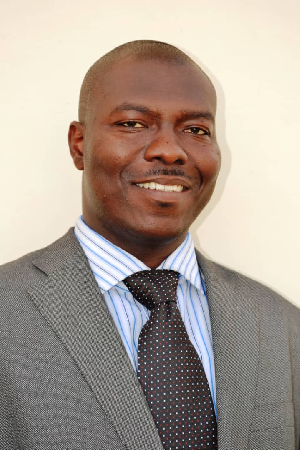- Home - News
- TWI News | TV
- Polls
- Year In Review
- News Archive
- Crime & Punishment
- Politics
- Regional
- Editorial
- Health
- Ghanaians Abroad
- Tabloid
- Africa
- Religion
- Election 2020
- Coronavirus
- News Videos | TV
- Photo Archives
- News Headlines
- Press Release
General News of Tuesday, 6 April 2010
Source: GNA
Chief Justice tasks the Judiciary to soar above reproach
Accra, April 6, GNA - The Chief Justice, Mrs Justice Georgina Theodora Wood has tasked members of the Judiciary, to appreciate the immense powers entrusted in them by the State and discharge their duties as expected of them.
She said the global acclamation of Ghana's track record in sustaining democratic governance and the painstaking efforts and sacrifice from Ghanaians to make that possible was not likely without the legal profession. "Ghanaian history and case law is replete with diverse contribution by judges in the attempt to ensure that the law is effectively employed to safe guard the rights of the people," she said.
Mrs Wood was speaking at the Kenneth Roemer Lecture on World Affairs at the State University of New York, Suny Geneseo on the topic: "The Dynamic of Law and Development in Ghana: The Case for Judicial Reform in an Emergent Democracy."
Roemer was born in Utica, New York, in 1910. After earning Bachelor and Masters of Arts degrees at Cornel, he joined a faculty at Thomas Proctor High School in Utica in 1936, teaching social science and serving as guidance counsellor until his retirement in 1973. The annual Lecture series on World affairs is a memorial to his long standing interest in global issues, endowed by his brother, the late Dr. Spencer J. Roemer, Emeritus Director of Admissions at Geneseo and former member of the Geneseo Foundation Board of Directors. Mrs Wood said there was a correlation between democratic governance and socio-economic growth.
She said sustaining democracy was to a very large extent, clearly dependent on an efficient and effective justice system; hence the critical need for judicial reform- to bring the judiciary to a healthy standard where it can play its role in national development effectively, without interference or external pressure from any quarter.
"Before the judiciary began to vigorously tackle judicial reforms based on sound strategic options, some 12 years ago, all major stakeholders in the administration of justice had thought that the judicial system was failing and remedial steps had to be taken quickly to save it from total collapse. The administration of justice was marked by frustratingly long delays in the resolution of cases, particularly, commercial cases." Mrs Wood said the judiciary had to grapple with such basic issues as outmoded, cumbersome and non-user friendly procedural rules of court, poor and inadequate physical infrastructure, poor remuneration and other conditions of service, difficult enforcement mechanisms, under funding, as well as lack of logistical support for the entire machinery.
"For example, the process of recording evidence in the courts, including the trial High Courts was most outrageous. Judges had to record these manually. No wonder it was practically impossible for judges to observe the demeanour of witnesses, thus robbing judges of an important criterion that on an occasion may assist the court to determine the credibility of a particular witness.
Mrs Wood said: "The situation has considerably improved in relation to all the Superior Courts and some Circuit Courts- the highest courts in the lower strata of courts- and a few District Courts, but sadly that laborious practice still subsists in most District Courts, the courts, which the majority of Ghanaians access on daily basis.
"There is real hope however, that quite soon, this archaic process will give way to automated courts and mechanised recording systems, which obviously are more reliable and efficient," she said.
She noted that the delays associated with the resolution of cases in court do not augur well for the socio-economic development of the nation. "The stark reality, as we quickly came to realise, is that the only way to forestall. mob justice or instant justice, and remove insecurity, fear and national unrest, which clearly constitutes a threat to democracy; is for the judiciary to function efficiently and effectively. The Judiciary had therefore no choice but, to undergo change.
"It became apparent that to promote a politically and socially stable environment for democratic governance and concomitantly socio- economic development, there was an urgent need for serious comprehensive structural and institutional judicial reforms." Mrs Wood said preparatory work needed for the judiciary to commence one of its biggest infrastructural projects ever undertaken by the service, was at the final stages.
The project involves the construction of a 34 court- room modern complex in Accra, to house courts and meet the other infrastructural needs of an ever growing judiciary.
She said one of the overriding concerns on the need for reform, bordered on the issue of corruption, which had dire consequences for emergent democracies in their quest for development. The Chief Justice called for capacity building and human resources development through programmes like continuing judicial education and the Supreme Court Clerkship and internship programmes.
She also called for review of existing procedural laws, such as outdated court rules; automation and mechanisation of the courts, Infrastructural development and institutional strengthening and establishment of specialised divisions of the High Court, including the commercial courts, human rights courts, land courts and industrial courts.
Mrs Wood said the world was going through a period of rapid transformation; with the impact being felt most in sub Saharan Africa, in the areas of democratic governance and economic development. She noted that national development cannot be attained without the collaborative efforts of all persons within the State working within the law.
Mrs Wood observed that the challenges facing democratic development in Ghana transcends the provision of mechanisms for the operation of government and change in administration.
"To a large extent this is no longer a problem. After decades of a convulsive history that featured among other things, human right violations, corruption, an economy that generated debilitating levels of poverty leading to an exodus of biblical proportions of some of our best human capital, Ghana is now recognised and celebrated around the world as a rare beacon of hope; of peace, democracy, and political and economic stability on the African continent.
"This is significant when measured against much of Africa's continuing horrendous experiences with civilian and military dictatorships, coups d'etat, and protracted ethnic conflicts and election-related carnage and civil wars."
She warned Ghanaians against complacency, adding that what is at stake is for the citizenry to count their blessings and map out areas where they had faltered, and chart a better course, which will ensure the socio-economic development of all. The Chief Justice said the real challenge facing Ghana was to work towards the enhancement of democratic governance. " I think the main challenge lies in ensuring that our systems work and does so efficiently and effectively, in order to meet the just expectations of the people in whom, as the preamble to our Constitution declares, sovereignty and justice reside and for whose welfare the institutions of state exist." Mrs Wood observed that after years of failed attempts at constitutional democracy, Ghanaians have resolved to build a stable multi- party constitutional democratic State, with the rule of law, human rights, separation of powers, independence of the judiciary, accountability and transparency, universal adult suffrage and free and fair elections as some of its core values. Touching on the country's oil find she said while it was the hope of Ghanaians that the additional resources would be judiciously managed, so that Central Government can allocate needed funds for all governance institutions, the Judiciary was also expecting to be financially autonomous as per article 127(1) and (2) of the 1992 Constitution. 6 April 10










